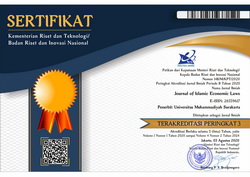ISLAMIC ECONOMIC PERSPECTIVE AND POTENTIAL OF ZAKAH ON CRYPTOCURRENCY
DOI:
https://doi.org/10.23917/jisel.v5i1.17204Keywords:
Zakah, Blockchains, CryptocurrencyAbstract
Indonesia is a Muslim-majority country, the survival of extensive zakat is very important for society. In the era of digital technology, the government encourages the government to improve classical zakat administration to ensure transpiration and the principle of facilitating zakat payments. This paper provides a study of the Islamic economic perspective and the potential application of zakat on cryptocurrencies. This paper provides a study of the Islamic economic perspective and the potential application of zakat on cryptocurrencies. In this study the author uses a qualitative approach where the main source is from the Indonesian zakat administration law and the secondary sources are published journals, articles, and reports. The findings of this paper suggest that governments and NGOs should facilitate and accept zakat payments in cryptocurrencies, because one of the advantages is the ability to make transactions more transparent and cross-border using blockchain technology. Provide a sense of security and more trust to the community towards zakat organizations in Indonesia. This study also found a way to calculate cryptocurrency zakat by determining the nisab, consistently above 85 grams for 12 months, so you can pay 2.5% zakat using the value of currency or value of precious metal. This research will help zakat managers in Indonesia to adopt technology in this regard.
Downloads
Downloads
Submitted
Published
How to Cite
Issue
Section
License
Copyright (c) 2022 Journal of Islamic Economic Laws

This work is licensed under a Creative Commons Attribution-ShareAlike 4.0 International License.



















